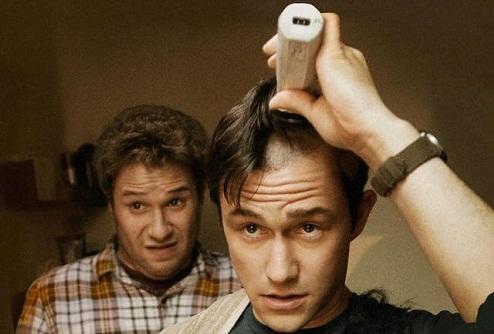Watch, wipe, repeat.
For anyone at least over 15, "Don Jon" is, by itself, reason enough to get all jealous over Joseph Gordon-Levitt and the strings he can pull over at Hollywood. Only in his early thirties and fresh from his breakout roles in a slew of highly successful films ("Inception", "Looper", "The Dark Knight Rises"), Gordon-Levitt now tries his hands on directing. But unlike his contemporary James Franco, whose dilettante self seems content in directing artsy films that perhaps no one would be able (or even want) to see, "Don Jon" has enough mainstream appeal to easily catapult Gordon-Levitt's potential as a filmmaker immediately into the forefronts of the movie industry. "Why is that?" You may ask. Well, if you're not familiar at all with "Don Jon", do yourself a favor and look it up on IMDb, read its plot, and then skim through its cast. Done? A malicious grin is definitely in order.
With its title being a Caucasian iteration of everyone's favorite moniker of sleazy womanizers, "Don Jon" is a film about a man addicted to porn and his relationship with a blonde bombshell he met in a bar, played by none other than Scarlett Johansson. "Don Jon", for the narrow-minded folks, may be deemed as nothing but an opportunistic vanity project on Levitt's part. Surely, with its sexually-charged tone and crucial casting of Johansson in a prominent role, this film may also make some people raise their eyebrows and others shake their heads both in admiration and utter disbelief. "A film about a porn addict with Scarlett Johansson cast as his sexy girlfriend." Honest to goodness, that's almost every heterosexual man's dream film project. On the surface, yes, "Don Jon" may seem like Joseph Gordon-Levitt's ultimate wet dream realized on film. But in all seriousness, if ever "Don Jon" has proven anything, then it is the fact that Gordon-Levitt, as a filmmaker, definitely has the genuine chops, and also the balls.
Story-wise, the film is not the kind that you would expect to blow you away, as it is a bit laid-back in its narrative flow and relatively light in execution. Quite simply, though "Don Jon" is mounted just like your typical rom-com film, it excels on how it depicts the so-called 'rush' of porn addiction in a series of repetitively kinetic camerawork that will rival the aesthetics of the likes of Danny Boyle and even Edgar Wright. "There's more to life than a happy ending." The film's tagline safely suggests. For me, the perfect tagline for the film, judging on how modernized its take is on the apathetic transience of libido, is "Watch, Wipe, Repeat." After all, the film is all about man's sexual relationship with technology, so what better way to emphasize this fact than with a not so-emotional and highly detached tagline such as that? Oh jeez, I'm already thinking out loud.
To get back on track, let's check on the film's characters. Gordon-Levitt's Don Jon, who frighteningly looks just like a "Jersey Shore" staple, is made to look grotesque and peculiar and highly detached from reality despite the fact that most men often do what he does, and that his problem with porn has already been tackled more believably in Steve McQueen's masterful "Shame". As a character, Don Jon, an Italian-American bartender and a devout churchgoer, is easy to empathize with on paper because of Joseph Gordon-Levitt's effortless wit and also simply because of pretty obvious reasons. But perhaps due to how heavily caricaturized Don Jon is (his ripped musculature, freakish tan, and perfectly-gelled hair), there seems to be a slight disconnect between the character and us, the audience, who should be able to easily identify with him. Don Jon, I guess, is a tad too larger-than life for the film.
Don Jon's parents in the film, on the other hand, though entertainingly played by both Tony Danza and Glenne Headly, are sadly too similar, characterization-wise, to Anjelica Huston and Ben Gazzara's turn in "Buffalo '66", from their dysfunctions as a couple up to their affinity towards football. Scarlett Johansson's character is also finely portrayed, what with her surprisingly apt accent. But sadly, the writing seems too weak to back the on-screen performance. Personally, it's Julianne Moore who has given the best performance in the film. Playing a middle-aged night student who has captured Jon's fickle attention, her line deliveries, which are oftentimes whisper-like and prosaic, bode well with her broken character.
In all fairness, the screenplay has numerous bright spots, such as the climactic scene between Joseph Gordon-Levitt and Julianne Moore, and some really fun moments (the confession scenes come to mind). But overall, it may just need 10 more pages or so to further flesh out the characters. If not for the film's surprisingly poignant final sequence, "Don Jon" would have been less memorable than it actually is.
Ultimately, looking past all of the film's flaws, "Don Jon" is actually a fun little portrait of a man's unhealthy addiction to internet smut, and a simple yet potent eye-opener regarding the delicate line that separates fucking from making love. After watching "Don Jon", you will realize that there's indeed a BIG difference between the two, and I'm not talking about sizes or anything, you dirty-minded fellow you.
FINAL RATING









